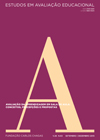The demons of evaluation: memories of teachers from when they were students
DOI:
https://doi.org/10.18222/eae.v26i63.3690Keywords:
Evaluation of Education, Evaluation of Learning, Methods of Evaluation, Psychological ViolenceAbstract
This article takes forty narratives of teachers who recalled situations of particularly memorable evaluation situations that occurred when they were students. Of these forty narratives, thirty-one express an intolerable abuse of power. Nine express emancipatory evaluative practices. Through an analysis of these discourses, the meanings of the abuses – humiliation, violence, discrimination, deception, arbitrariness – and of the minority emancipation are quantified and qualified, seeking to explain these practices in the light of the historical, social, organizational and professional times. It is concluded that these practices need to be fought against and prevented; and, that stricter policies and practices of access to the profession and the exercise of more interactive pedagogic action are required.
Downloads
References
ALAIZ, Vítor; GÓIS, Eunice; GONÇALVES, Conceição. Auto-avaliação de escolas –pensar e praticar. Porto: ASA, 2003.
ALLAL, Linda; CARDINET, Jean; PERRENOUD, Phillipe. L’Évaluation formative dans un enseignement différencié. Revue Française de Pédagogie, v. 60, p. 73-78, 1982.
ALVES, José Matias. A Paixão do olhar. In: (Ed.). Teorias e práticas da paixão docente. Porto: Porto, 1998. p. 7-8.
ALVES, José Matias. Reinventar as escolas para redescobrir as pessoas. Revista Interdisciplinar sobre o Desenvolvimento Humano, n. 1, p. 67-74, 2010. Disponível em:<http://www.ridh.fmleao.pt/paginacao/Reinventar_a_escola.pdf>. Acesso em: 13 nov. 2015.
AZEVEDO, Joaquim. Avenidas da liberdade: reflexões sobre política educativa. Porto: ASA, 2008.
BAPTISTA, Isabel. Dar rosto ao futuro: a educação como compromisso ético. Porto: Profedições, 2005.
BARTHES, Roland. No Seminário. In: SEABRA, José Augusto (Org.). Barthes: discurso – escrita: texto. Braga: PAX, 1979. p. 69-78.
BLOOM, Benjamin. Taxonomy of educational objectives. Boston, MA: Pearson Education, 1984.
BOURDIEU, Pierre. Proposições para o ensino do futuro. Cadernos de Ciências Sociais, v. 5, p. 101-120, jul. 1987.
DE KETELE, Jean-Marie. L’ Evaluation conjuguée en paradigmes. Revue Française de Pédagogie, n. 103, p. 59-80, 1993. DOI: https://doi.org/10.3406/rfp.1993.1298
EISNER, Elliot. The perceptive eye: towards the reformulation of educational evaluation. California: Stanford University, Stanford Evaluation Consortium, 1975.
ETZIONI, Amitai. The semi-professions and their organization. New York: Free Press, 1969.
EVANGELHO de Marcos, 5: 9. In: BÍBLIA. Português. Bíblia sagrada. Tradução de Reverendíssimos Padres Capuchinhos. Lisboa: Verbo, 1976. p. 1150. Bíblia contendo o Antigo e o Novo Testamento.
FERNANDES, Domingos. Avaliação das aprendizagens: desafios às teorias, práticas e políticas. Porto: Texto, 2005.
FORMOSINHO, João. O dilema organizacional da escola de massas. Revista Portuguesa de Educação, Braga, n. 3, p. 23-48, 1992.
GUBA, Egon; LINCOLN, Yvonna. Competing paradigms in qualitative research. In: DENZIN, Norman; LINCOLN, Yvonna (Ed.). Handbook of qualitative research. Thousand Oaks, CA: Sage, 1994. p. 105-117.
LEITE, Carlinda. Para uma escola curricularmente inteligente. Porto: ASA, 2007.
MACHADO, Joaquim; ALVES, José Matias (Ed.). Melhorar a escola – sucesso escolar, disciplina, motivação. Porto: Universidade Católica Editora, 2014. Disponível em: <http://www.uceditora.ucp.pt/resources/Documentos/ UCEditora/PDF%20Livros/Melhorar-a-escola_%20ebook.pdf>. Acesso em: 13 nov. 2015.
MEIRIEU, Philippe. Mutations sociales, pédagogie et travail des enseignants. 2009.
Disponível em: <http://educeanalise.blogspot.com/2009/02/conferencia-realizada-por-philippe.html>. Acesso em: 13 nov. 2015.
PAIS, Paulo. Práticas classificativas de professores do ensino secundário – significados e valores. Lisboa: Universidade Católica Portuguesa, 1998.
PARLETT, Malcolm; HAMILTON, David. Avaliação iluminativa: uma nova bordagem no estudo de programas inovadores. In: GOLDBERG, Maria Amélia; SOUSA, Clarilza (Org.). Avaliação de programas educacionais: vicissitudes, controvérsias, desafios. São Paulo: EPU, 1982.
PERRENOUD, Philippe. Des différences culturelles aux inégalités scolaires: l’évaluation et la norme dans un enseignement indifférencié, In: ALLAL, Linda; CARDINET, Jean; PERRENOUD, Philippe (Dir.). L’évaluation formative dans un enseignement différencié. Berne: Lang, 1979. p. 20-55.
PERRENOUD, Philippe. Não mexam na minha avaliação! Para uma abordagem sistémica da mudança pedagógica. In: ESTRELA, Albano; NÓVOA, António (Ed.). Avaliações em educação: Novas Perspectivas. Lisboa: EDUCA, 1982. p. 155-173.
PERRENOUD, Philippe. Pour une approche pragmatique de l’évaluation formative. Mesure et évaluation en education, v. 13, n. 4, p. 49-81, 1991.
PERRENOUD, Philippe. L’évaluation des élèves. De la fabrication de l’excellence à la régulation des apprentissages. Bruxelles: De Boeck, 1998.
PERRENOUD, Philippe. Os dez não-ditos ou a face escondida da profissão docente. Espaço Pedagógico, v. 6, n. 2, p. 105-121, dez. 1999.
RANJARD, Patrice. Les enseignants persécutés. Paris: Robert Jauze, 1984.
SCRIVEN, Michael. The methodology of evaluation. In: TYLER, Ralph; GAGNÉ, Robert; SCRIVEN, Michael (Ed.). Perspectives of curriculum evaluation. Chicago: Rand Mac Nally, 1967. p. 39-83. (AERA. Monograph series on curriculum evalution, n. 1).
STAKE, Robert. The countenance of educational evaluation. In: WORTHEN, Blaine; SANDERS, James. Educational Evaluation – theory and practice. California: Wadsworth, 1973.
TYLER, Ralph. Basic principles of curriculum and instruction. Chicago: University of Chicago, 1949.
Downloads
Published
How to Cite
Issue
Section
License
Authors who publish in this journal agree to the following terms:
a. Authors retain the copyright and grant the journal the right to first publication, with the paper simultaneously licensed under the Creative Commons Attribution license that allows the sharing of the paper with acknowledgment of authorship and initial publication in this journal.
b. Authors are authorized to assume additional contracts separately, for non-exclusive distribution of the version of the paper published in this journal (for example publishing in institutional repository or as a book chapter), with acknowledgment of authorship and initial publication in this journal.
c. Authors are allowed and encouraged to publish and distribute their paper on-line (for example in institutional repositories or on their personal page) at any moment before or during the editorial process, as this can generate productive changes, as well as increase the impact and citation of the published paper (See The Effect of Open Access).





